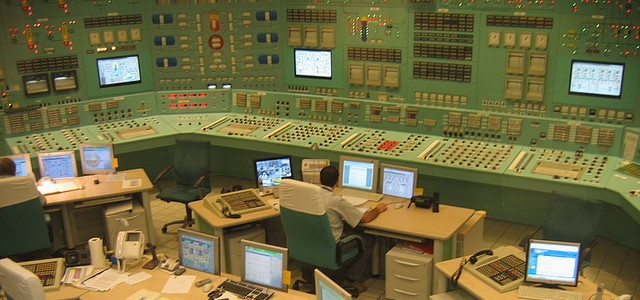In the case of Hungary one can only speak about a negative Energiewende, or the “black energy transition”, which is apparently transforming the whole energy system backwards. If nothing changes soon, one huge, state-owned ‘national’ energy trust would be formed, managing resources, production, transmission and distribution of energy – majorly based on fossil fuels and nuclear. Exactly how the socialist area left it in the early 1990’s. Ada Ámon explains.
Within one week two major decisions of the European Commission struck the Hungarian government’s plan of a new Russian designed, financed and also constructed nuclear power plant next to the existing four reactors in Paks.
At first, Elżbieta Bieńkowska, the EU Commissioner for Internal Market, Industry, Entrepreneurship and SMEs, announced an infringement procedure against Hungary for lack of compliance with EU public procurement rules. The construction of two new reactors without a transparent procedure “is considered as direct award of the Paks II nuclear project.” The procedure lacked transparency, non-discrimination, and equal treatment; therefore it is not ensured that all economic operators have had fair chances to participate. The second decision was signed off by EU Commissioner Margarethe Verstager responsible for Competition, announcing an in-depth investigation into the investment support of this project. This is in line with the complaint filed already last summer by Energiaklub, a Hungarian think-tank. According to their assessment the project fulfills all the five criteria of EU illegal state aid rules: 1) It involves state resources, 2) providing an arbitrary economic advantage to this particular power plant 3) highly selective, 4) distorting fair market competition and finally 5) likely to cause market distortion.
And this exactly how nuclear projects and other power plants were dealt with in the socialist area. Everything is so similar: the players, the secrecy, and the way public money is poured in without caution. There is one major difference though: Hungary is now a member of the European Union and has committed itself to comply with the rules of the bloc. And hopefully the enforcement of these rules will kill similar reckless projects in most of the member states.
Nevertheless, some of the Central Eastern European leaders blame the EU for allegedly taking their country’s sovereignty. The fact that they can no longer set the entire energy mix according to their taste – pardon(!) according to their country’s circumstances – must be annoying. Despite the provisions of Art. 194 TEU, member states have indeed limited room for maneuvering; additionally to the general rules and the market regulations, all member states have to do their homework on energy efficiency and renewables, which already determines a fair share of the energy mix.
Let’s have a short glance at some frightening measures that make most decent investors hesitant to commit or maintain capital in (sustainable) energy development in Hungary. There is no coherent renewable regulation since 2011, when the Government proposed a new set of rules, which was supported by the renewable industry but never got adopted. This artificially forced ex-lex situation causes a total lack of predictability and accountability of the policy framework, most importantly about the future of feed-in tariffs. This was to be expected after the very first measures of Orban’s Development Minister in 2010, who simply withdrew the call for tender on licensing 410MW wind capacity without any explanation.
Earlier this year the government did put a considerable levy on PV installations, called “environmental protection fee”. And when looking at the support that energy efficiency received in the last years, the picture gets even darker. The FIDESZ election campaign promised 100.000 homes to be refurbished with public funding. But: nothing happened. Even so, a couple of weeks ago, the minister responsible for the EU cohesion funds stated that Hungarian households should not receive “free money” from community sources to renovate their homes according to newest energy efficiency standards. This blocks an economically viable solution.
It is obvious that EU cohesion sources are allowed to support these small scale investments, moreover encouraged by the European Commission. Furthermore, the artificially lowered household energy price – among other problems – hinders energy efficiency investment in the building sector as postponing the pay-back time of the investments significantly. This single action was crucial enough for FIDESZ winning the elections last year. And because of all the above mentioned uncertainties and hectic way of energy governance, even huge corporations (GDF, EDF, RWE and E.ON) that own largely the Hungarian energy industry are trying to get rid of their assets.
And who would buy in such circumstances? Indeed, the Hungarian state. So this is the way Hungary rebuilds an outdated energy system, which was dismantled 20 years ago and was labeled as socialist: one huge, state-owned ‘national’ energy trust majorly based on fossil fuels and nuclear.
It is difficult not to believe that all these actions are happening to facilitate the mega project in Paks and take full control over the energy system in Hungary. It seems that the supposedly right wing Orban government does intend to keep private investment in energy sector and will not let small and sustainable energy business flourish. Instead they pour recklessly public sources into anachronistic investments. Indeed: running fast into the past.
By Ada Ámon, Senior associate, E3G – Third Generation Environmentalism, Berlin office
Senior advisor, Energiaklub Climate Policy Institute & Applied Communications, Budapest

The Orban government is fascist. They are right-wing, certainly. But they are not capitalist — they have no interest in private industry or captialism or competition or markets. They are command-and-control fascists.